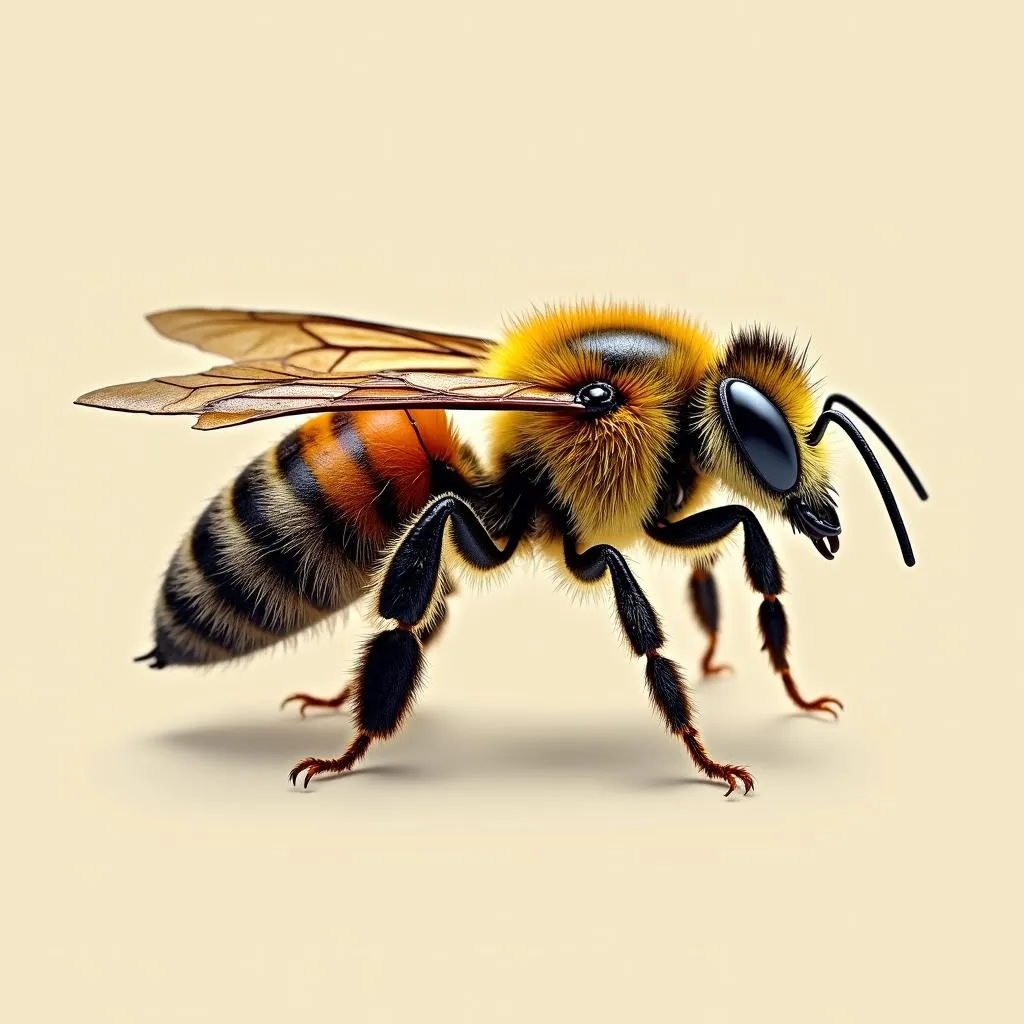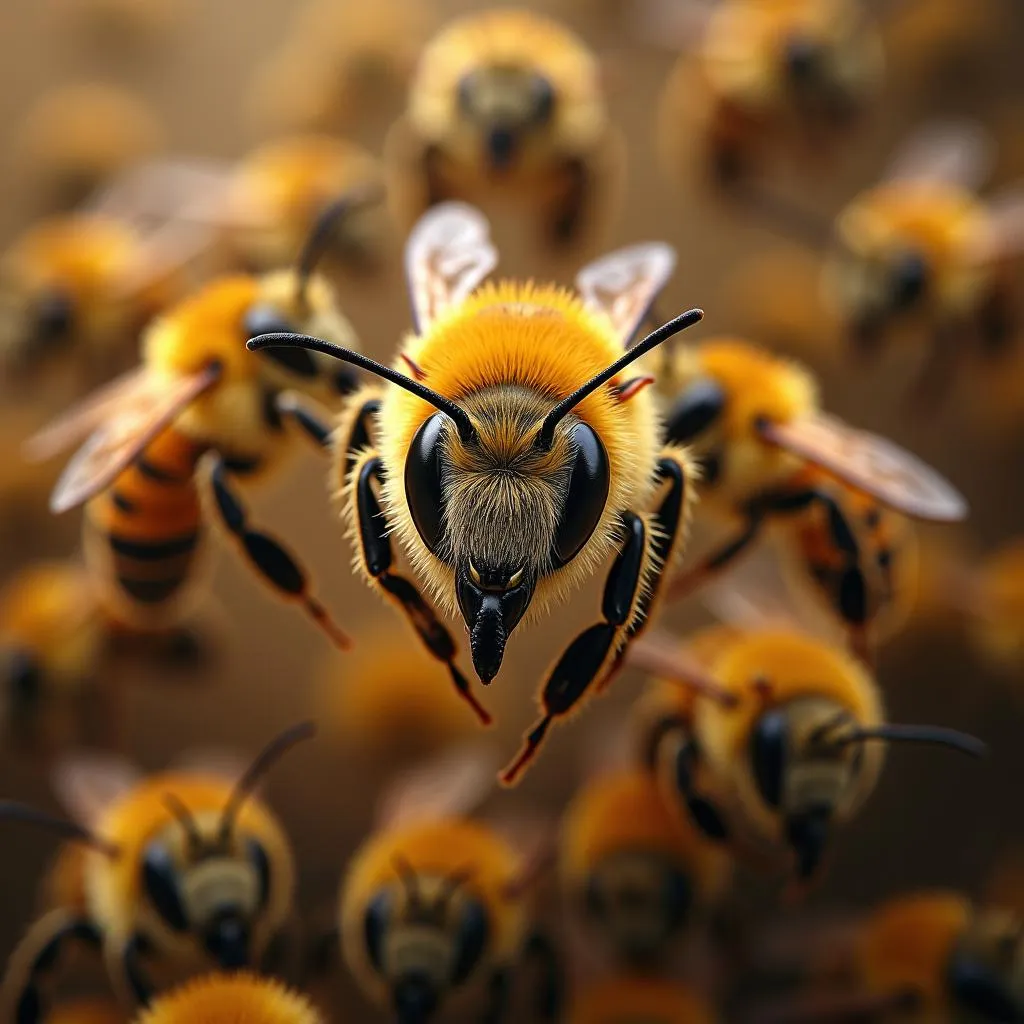The African Bee Swarm Tactic: A Masterclass in Defense
The African Bee Swarm Tactic is a fascinating phenomenon that showcases the power of collective defense in the animal kingdom. These bees, known for their aggressive nature, have developed a unique and highly effective strategy to protect their hives from predators.
Understanding the African Bee
Before diving into their swarm tactic, it’s important to understand what sets African bees apart. Also known as killer bees, they are a subspecies of the Western honey bee (Apis mellifera) that originated in Africa. They were brought to Brazil in the 1950s in an attempt to increase honey production but escaped and interbred with European honey bees, creating the Africanized hybrid we know today.
African bees are smaller than their European counterparts but are far more aggressive and defensive of their hives. They react to disturbances more quickly and in larger numbers, making them a formidable force to reckon with.
 Close-up of an African bee
Close-up of an African bee
The African Bee Swarm Tactic
The African bee swarm tactic is a multi-faceted approach to defense that involves:
1. Early Detection and Alarm Pheromones:
African bees have a highly sensitive system for detecting threats. Guard bees constantly patrol the area around the hive, and at the slightest sign of danger, they release alarm pheromones. These pheromones act as a chemical signal, alerting the entire colony to the threat and mobilizing a swift and coordinated response.
2. Rapid Mobilization and Pursuit:
Unlike European bees, which may send out a small contingent of defenders, African bees respond en masse. Hundreds or even thousands of bees erupt from the hive within seconds, ready to attack the perceived threat. They are relentless in their pursuit, chasing intruders for significant distances, sometimes up to a quarter of a mile.
3. Aggressive Stinging Behavior:
African bees are equipped with barbed stingers that remain embedded in the victim’s skin, releasing more venom with each sting. The mass stinging attack overwhelms the target, injecting a potent mix of toxins that can be fatal, especially to those who are allergic or receive multiple stings.
 A swarm of African bees attacking a threat
A swarm of African bees attacking a threat
The Science Behind the Swarm
The African bee swarm tactic is a remarkable example of how evolution has shaped animal behavior. Their aggressive defense is a survival strategy that has allowed them to thrive in harsh environments where predators are abundant.
The key to their effectiveness lies in the combination of their hypersensitive detection system, rapid mobilization, and potent venom. This trifecta creates a formidable defense that deters most predators.
Impact and Importance
The African bee swarm tactic, while a fascinating natural phenomenon, also poses significant risks to humans and animals. Their aggressive nature has led to numerous incidents of stings, some of which have been fatal.
However, it’s important to remember that African bees are not inherently malicious. They are simply protecting their hives and their colony. Understanding their behavior and taking appropriate precautions can help to mitigate the risks of bee stings.
Frequently Asked Questions
1. What should you do if you encounter an African bee swarm?
- Run away as fast as possible in a straight line.
- Do not swat at the bees, as this will only agitate them.
- Seek shelter indoors or in a car.
- If stung, remove the stingers as quickly as possible and seek medical attention.
2. How can you tell the difference between African bees and European bees?
- African bees are slightly smaller and darker than European bees.
- However, it is difficult to distinguish between the two based on appearance alone.
- The best way to identify African bees is by their aggressive behavior.
3. Are African bees beneficial to the environment?
- Yes, African bees are important pollinators, playing a crucial role in the ecosystem.
- They pollinate a wide variety of crops, contributing significantly to food production.
4. Can African bees be controlled?
- Managing African bees can be challenging, but there are methods to reduce the risk of encounters and stings.
- These include:
- Avoiding areas where bees are known to nest.
- Wearing protective clothing when working outdoors.
- Contacting a professional beekeeper for assistance with hive removal.
5. Are there any benefits to African bee honey?
- African bee honey is similar in taste and nutritional content to honey from other bee species.
- It is a natural sweetener and is believed to have various health benefits.
Conclusion
The African bee swarm tactic is a testament to the power of collective defense in the animal kingdom. While their aggressive nature can pose a threat, understanding their behavior is crucial for coexisting with these fascinating creatures. By respecting their space and taking appropriate precautions, we can appreciate the vital role they play in our ecosystem.
If you require assistance with bee removal or have any concerns about African bees in your area, please do not hesitate to contact us. Our team of experts is available 24/7 to provide guidance and support. Call us at +255768904061, email us at [email protected], or visit our office located in Mbarali DC Mawindi, Kangaga, Tanzania.



